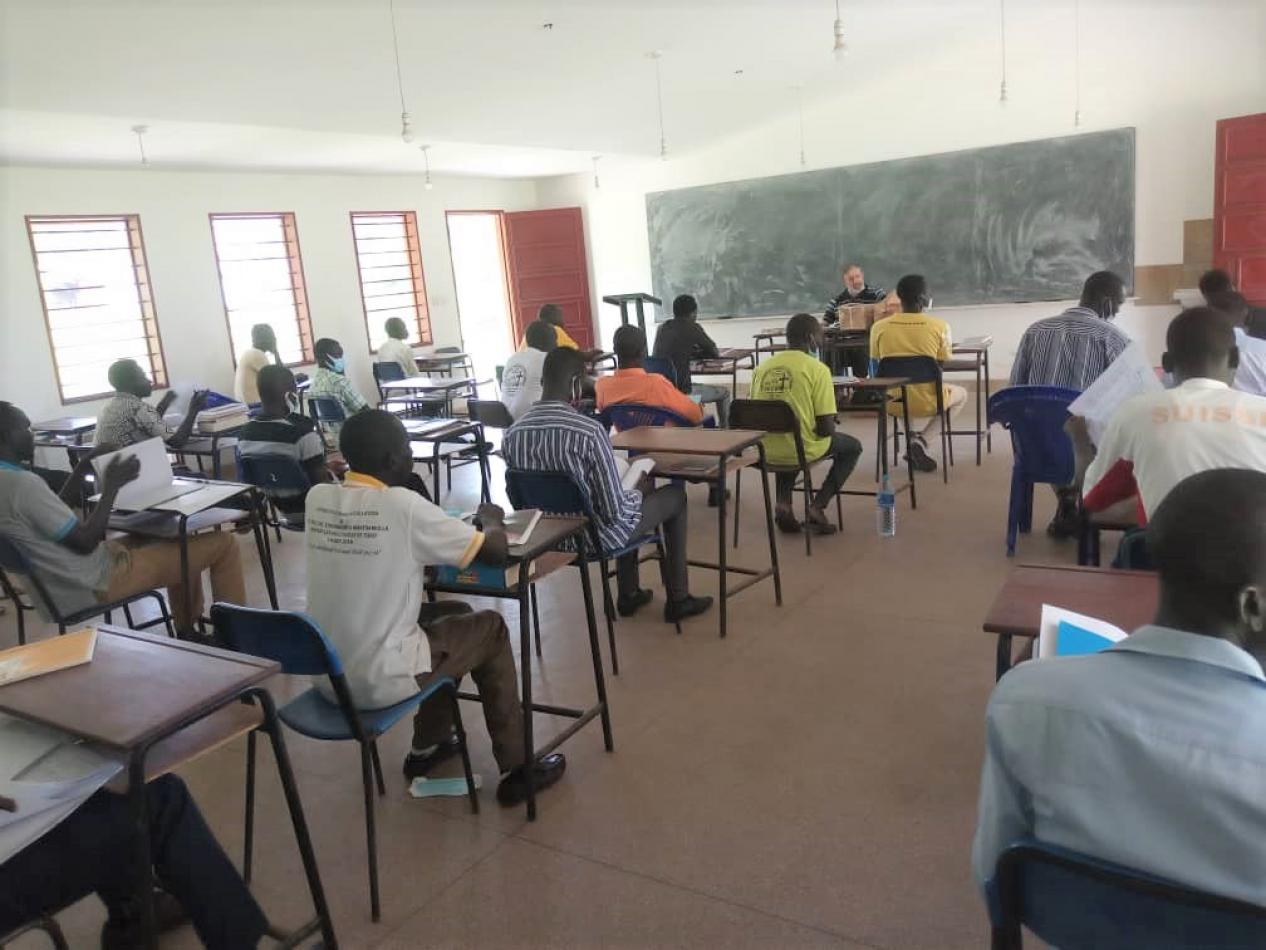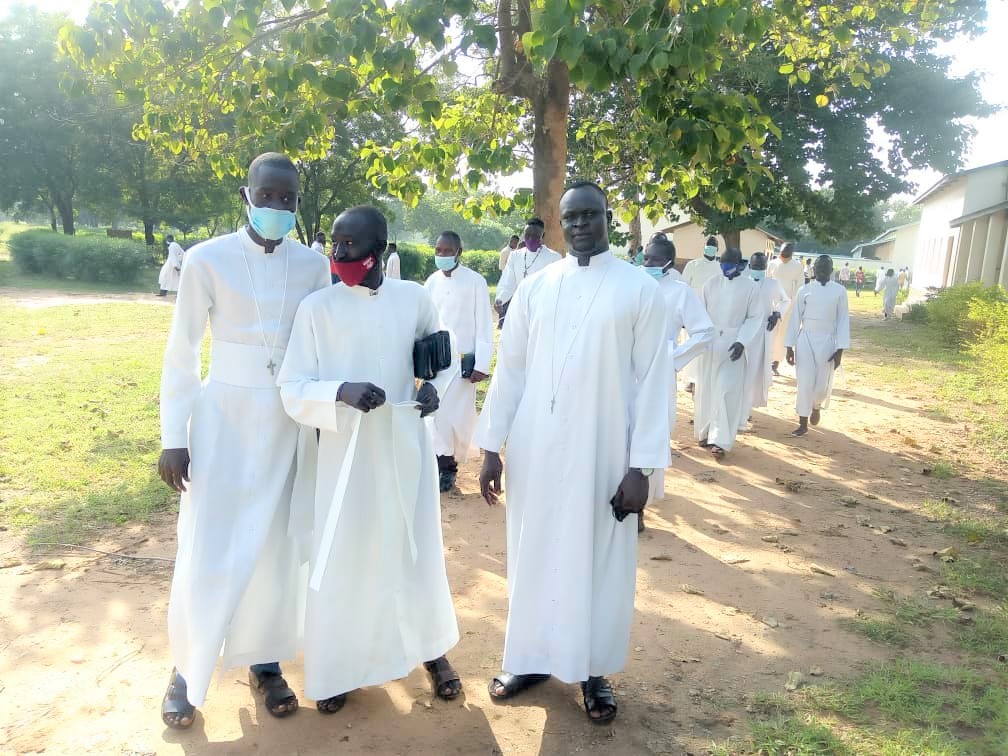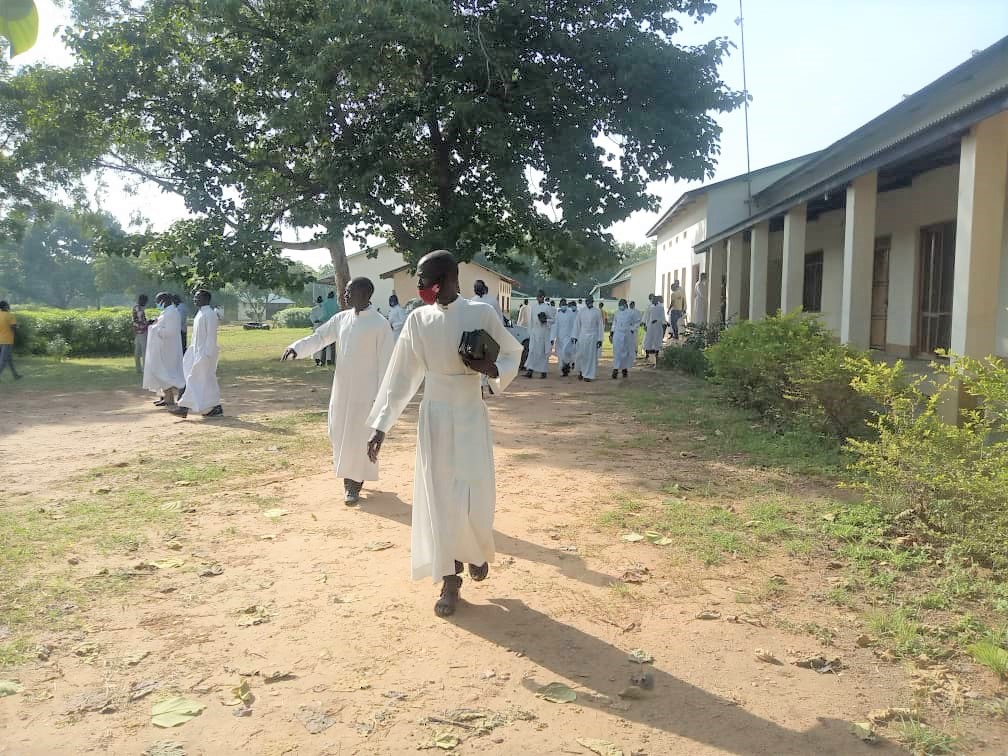Daniele Comboni
Missionari Comboniani
Area istituzionale
Altri link
Newsletter
Thursday, December 9, 2021
“I can say that we all of us try our level best to form our students. Problems and difficulties are inevitably there. Financial and logistic difficulties are enormous. We believe, however, that when there is good will God does assist our students and the formators with his grace. But this should not prevent us from continuously assessing the situation so that we may improve it for the best.” (Fr. Guido Oliana, MCCJ)
PRIESTLY FORMATION
IN ST. PAUL MAJOR SEMINARY OF JUBA
Introduction
Priestly formation includes at least four basic dimensions: human, spiritual, intellectual, and pastoral. The formation director is responsible for the integral formation constituted by these four dimensions. The other people involved in the life of the seminary, like the lecturers who are not formators, should also be concerned about this integral formation. However, the lecturer who is not a full time formator tends to be more interested in the intellectual dimension and the spiritual director in the spiritual dimension.
1. Description of my experience of the situation of St. Paul’s Major Seminary
Our formative structure in St. Paul’s is rather classical or traditional. We have one Rector both for the philosophy and theology sections, two Vice-Rectors, two Deans of Studies, one General Spiritual Director, who organizes the spiritual life of the whole seminary, and the various lecturers or people from outside who can also follow some students in spiritual direction. The idea of “integral formator” (internal and external forum) in one person, as we have it in our Comboni formation structure, does not exist here. Neither there is the idea of an animator in charge of a group, as, for instance, already in Gaba Major Seminary (Uganda) where I studied theology was introduced more than 40 years ago. The number of students both of philosophy and theology is around 150.
Personally, I have been the spiritual director of some students and a full time lecturer in philosophy and theology for seven years. I am just beginning my eighth year. First of all, I like to underline the importance of an adequate preparation, which is necessary to give a qualified service both in the human and spiritual formation, but also in the pastoral and in intellectual formation. I will, therefore, describe the courses I teach and my qualifications for them. This is to underline the need of professionalism in our formative commitments.
In the Philosophy Section I have been teaching the following courses: Latin (an important tool for an adequate philosophical and theological formation), History of Greek and Roman Civilization, Introduction to Liturgy and Introduction to the Mystery of Christ, Medieval Philosophy, Contra Gentiles and De ente et essentia of St. Thomas Aquinas, and Faith and Reason.
In the Theology Section I have been teaching all the courses of Liturgy (Introduction, the celebration and theology of the sacraments). In Systematic Theology I have been teaching the following subjects: Theological Method, Patrology, Trinity, Christology, Ecclesiology, and Ecumenism. Recently, since a lecturer of Dogmatic Theology has been consecrated Bishop, I have assumed also the remaining Dogmatic Courses. Thus I had to leave Liturgy to another lecturer qualified in the field. At the moment, therefore, besides the above mentioned courses, I have had to add: Fundamental Theology, Grace and Sin, Sacramentology, Creation and Eschatology.
My experience of teaching so many different subjects has been tremendously enriching. Of course, we do not have many lecturers prepared to cover courses like Liturgy and Dogmatics, thus I had to assume extra courses myself. In many other seminaries or high institutions of learning people may think that this is crazy, but that is our situation, due to our precarious conditions also from the financial point of view.
Two legitimate objections could be addressed to me in particular: 1) How could you teach both philosophical and theological courses at the same time? Are you prepared or qualified for them all? 2) How could you prepare so many subjects at the same time?
First, I need to speak about my qualifications because – as I mentioned above - to teach in a Major Seminary like in any University, one must have the necessary qualifications. I am qualified in Liturgy (Doctorate in Liturgical Theology from the Pontifical Liturgical Institute of Rome) (SLD) and in Systematic Theology (Master in Systematic Theology from the Lutheran School of Theology at Chicago, USA [MTh], and Doctorate in Systematic Theology in the Theological Faculty of Milan) (STD).
Secondly, I answer the question of how I prepare myself to teach so many subjects? In my preparation, I chose a good book or article on the subject matter that I find and present it in class. Of course I add my personal reflections and observations, trying always to actualize the topics as much as possible for our context of South Sudan. I ask the students to elaborate some papers. I usually give hand-outs so that the students may have the material to study. Our libraries (of philosophy and theology) are utterly deficient, not updated. We do not have subscriptions to Journals and no internet facilities for students are available. All books are dated. At times, I ask myself how the students can make their research in such inadequate libraries. Again, this is due especially to financial constraints.
2. Evaluation of the situation
I have briefly described our situation. Now an assessment is in order. Questions from the human, spiritual, pastoral, and academic points of view could be asked: 1) Can the few formators know and follow personally and effectively more than 150 students? At the end of the year, are their evaluations to be sent to their Bishops adequate enough? 2) Is the philosophical and theological syllabus adequate to our South Sudanese students, who come often from very poor secondary schools and have an insufficient knowledge of English? What do they understand and assimilate? 3) Should we not reduce and adapt the programs? 4) How are our students trained pastorally?
I try to answer these questions as honestly as possible, taking into account my personal experience of St. Paul’s Major Seminary.
Firstly, I question the fact that students often come from their villages to St. Paul’s, after having attended very poor secondary schools, without a proper introductory or propaedeutic program, which is officially required by the universal Church. This program would help our students in basics of human, spiritual, and academic formation, so that they may be ready to decently face philosophical and theological studies. The objection is that we do not have in the country adequate structures from the logistic point of view and the personnel is not enough. However, with good will something could be done in the premises of St. Paul’s.
Secondly, I doubt that the formators know the students deeply. Consciously or unconsciously, students at times may hide some problematics. Once I was talking to a student of the last year of theology with serious problems in the field of sexuality. He had shared with me some of his difficulties. I asked him: “Do you speak about these problems with your spiritual director”? He answered: “No, with my spiritual director I have friendly talks.” In these conditions, I feel that the evaluations at the end of the year are at times rather superficial. According to my experience of spiritual direction, it takes time to alert students to their basic needs of human and spiritual maturation. Especially at the beginning of their journey of formation, they are often very superficial in their concerns. Some come with psychological traumas due to the many years of war or because of their often dysfunctional family background. At times there is no continuity in spiritual direction. In the following year, at times, they change their spiritual director.
Thirdly, from the academic point of view we follow the curriculum that the universal Church requires of Major Seminarians. Our Seminary is affiliated to the Pontifical Urbanian University (Rome). Hence we have to follow the curriculum suggested so that our finalists could sit at the end of the theological courses for their STB (Bachelor of Sacred Theology). In principle, we are allowed to make some adaptations in some subjects, but in practice it is not always easy to realize it, given the course load. Moreover, it is presumed by the universal Church that Catholic priests should have a basic common formation so as to interact internationally with priests from other countries and to be able to read and study the essential bibliographies on the subjects studied.
Fourthly, pastorally our situation is also not ideal. It is difficult to organize pastoral experiences for more than 150 students during the school period. Holidays could be a good time to organize pastoral work in their dioceses. Something is done, but something more and better could be organized by the various dioceses. Moreover, following up the seminarians in their pastoral work and spiritual situation during holidays is also a problem.
Conclusion
In conclusion, I can say that we all of us try our level best to form our students. Problems and difficulties are inevitably there. Financial and logistic difficulties are enormous. We believe, however, that when there is good will God does assist our students and the formators with his grace. But this should not prevent us from continuously assessing the situation so that we may improve it for the best.
Fr. Guido Oliana, MCCJ






